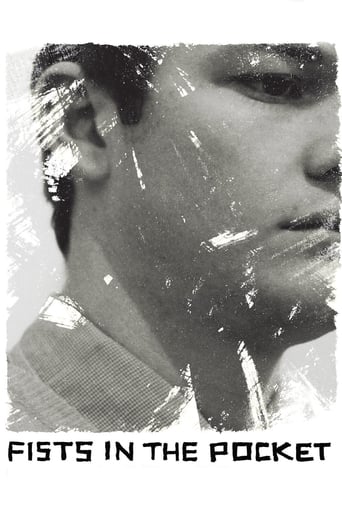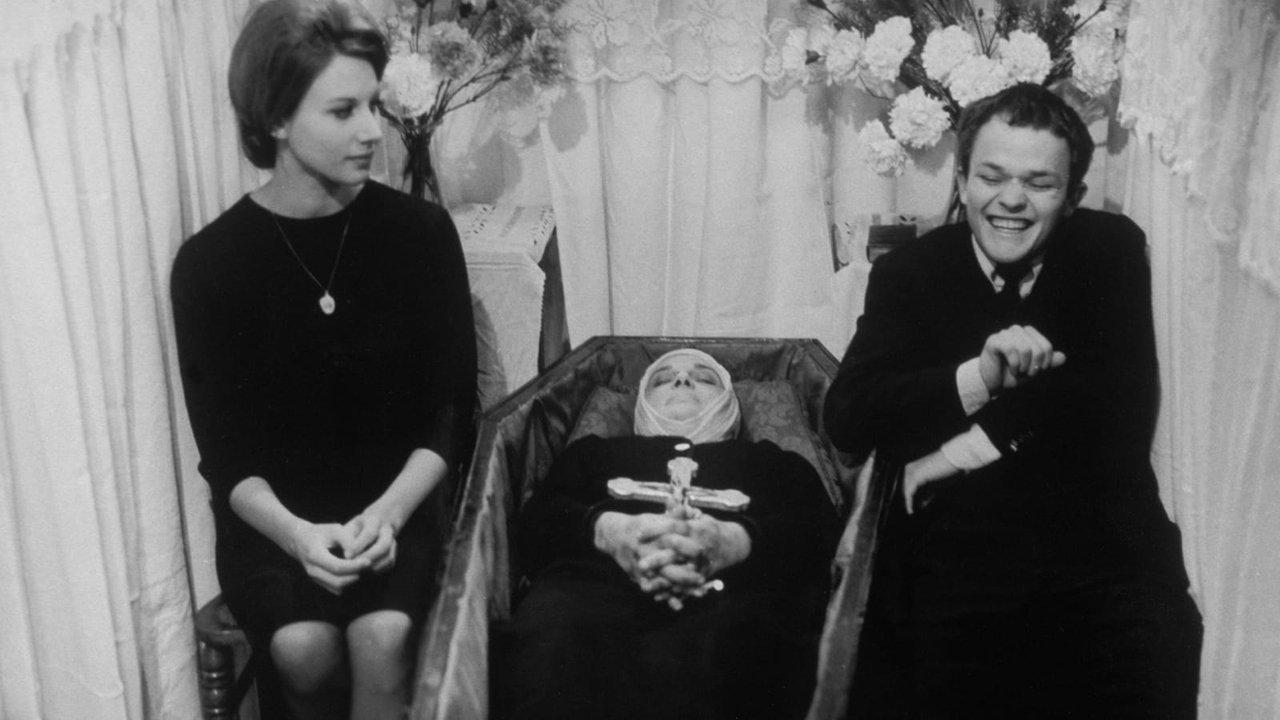dbdumonteil
An epileptic young man in a bourgeois family who,as soon we meet them ,seems not only to be living in the past,but to be already dead :they only get out of the house to go to the cemetery;the blind wodowed mother has delegated her authority to her elder son ,a nice handome man who "takes care" of his siblings :a girl who seems in love with her brother -she does want to see the prostitute her brother sleeps with,as though she would like to be her(and thus his) just for a while -, a half-wit ,and Sandro who passes for a ne'er do well to his clever brother's eyes:he is denied everything ,all his attempts to get out of this mausoleum fail (taking his driving licence , raising rabbits )and his restrained hatred knows no bounds .He's really got a chip on his shoulder ,and he becomes almost fascistic : one has to get rid of the improductive population - like in Rosselini's " Germania Anno Zero "in which a schoolteacher ,feeling nostalgic for the Führer, urges a little boy to kill his bedridden father-He does not realize he is in a cul de sac ;his big brother did stay with them because of the mother ,but as soon as she dies ,he wants to get married and to live his life .Sexually repressed -he refuses to dance with a girl who invites him (and not the other way around) and can only have sex with a prostitute,life is a blind alley for Sandro ;as for his big brother,he cannot stand his licit happiness ,he feels the approval of the others ,of the society ,still cooped up in this petty life.As he is not able to get rid of this powerful man who accepts the golden rules,he sacrifices a substitute ,his kid brother.Bellochio 's movie should be seen as a fable ,a transparent metaphor ,not really realistic ,with elements of melodrama (the sister's fate);Sandro is sick ,but so are people around them even though they are not aware that their old world ,through a slow process but inexorably , is collapsing .Epilepsy is just an alibi."Il Pugni In Tasca" took a rebel stand against the family;but Marco Bellochio's fight had only just begun: " Nel Name Del Padre " denounced the Church;in "Marcia Trionfale",at a time the militay service still existed in Italy (and almost everywhere in Europa),the army was hauled over the coals.
Hitchcoc
My signature uses the words "God Awful Experience." This film with its unraveling psychosis is hard to watch, but it's principle character is simply necessary to draw out the sickness of all the participants. A young man, prone to epileptic seizures, is truly psychotic. He is bored and sees life as quite hopeless. In his nihilistic, existential angst, he has little trouble murdering his mother whom he sees as a nuisance, a distraction, and a pest. He wants some kind of autonomy. There is fratricide and incest and other horrible realities in this film. Killing seems somewhat easy, though hiding the act is not easy. The perpetrator is not able to achieve satisfaction. There is something pretty Freudian here (perhaps counter-Freudian). One strength is that while we have no idea what will happen next and there is no natural flow to this, we can't take our eyes off the movie. If you want something to challenge your senses, take a gander at this film.
mikeburdick
The Sixties was a time of breaking rules and exploring social themes and political ideas that weren't allowed to be expressed in the repressive Fifties. It was a Golden Era of Italian cinema, producing Antonioni's, Visconti's and Fellini's best films, along with so many gems like Olmi's "Il Posto", Germi's "Divorce: Italian Style" and Monicelli's "The Organiser." "Fists in the Pocket" stands out for its dark subject matter, which examines the mind of a sociopath.While this was not new ground—Clouzot's "Diabolique", Clement's "Purple Noon", Powell's "Peeping Tom" and Hitchcock's more lurid "Psycho" allowed us into the head of a killer—"Fists in the Pocket" portrays a much more nuanced character. What those films don't spend a lot of time on is the motivation behind their characters' actions, outside of their own amoral nature or perhaps some hinted trauma. In this film, while we certainly don't sympathise with the characters' actions, we clearly understand their motivations.The protagonist of the film is Sandro, but I'd argue that the main character is the family, since it's the family dynamic that drives all action in the film. Sandro and two of his three siblings have varying degrees of epilepsy, and all three grown children live with and care for their blind mother. There's a definite sense of claustrophobia and dread in this family, who all seem trapped by their own love for each other. Their desire to break free of their mother's control and the burden of caring for each other leads to plans being hatched and tragic consequences.It's quite an oddball story, almost Lynchian, but what makes the characters so utterly believable is the unpredictability of their behaviour, along with some excellent acting, particularly by Lou Castel, who allows us to see into his mind without saying a word. Add to that a soundtrack by Ennio Morricone and absolutely sublime photography—it's one of those rare films where you can frame almost every shot—and you've got one of the standout films from a standout period of filmmaking.
stededalus
Marco Bellocchio directs his first full-length film, and it's already a masterpiece, a milestone in the history of Italian cinema.This movie is all about contemporary uneasiness and family crisis in today's society (only, some two decades in advance). Every time I hear of family massacres on the news, I've got to think about problematic, disturbed Lou Castel deciding to get rid of his mother and younger brother for the benefit of the eldest, embodying not only a stage of criminality, but above all a wrong philosophy, a twisted point of view about life, a failed maturity. Ennio Morricone' score is just perfect, fully successful in his aim to highlight the dramatic potential of the story. Lou Castel has never acted like this, his grimacing and his usage of the dead moments are unforgettable. The frames of the mother's death are like an howl, they "send shivers down your spine". A must-see.


 AD
AD



